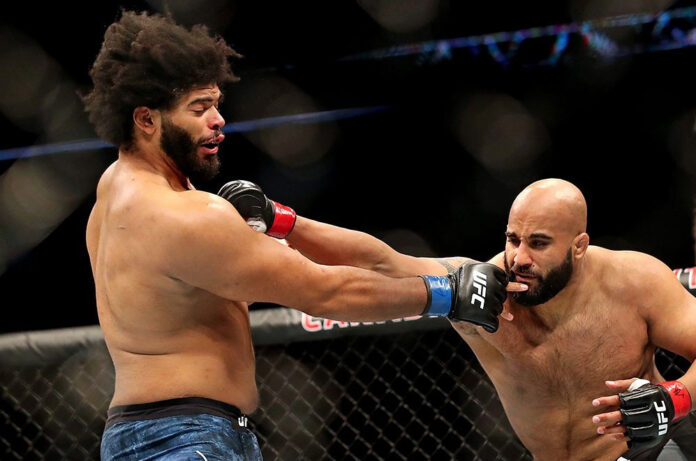As UFC is delving into CBD research to learn more about how it can help athletes, one fighter is speaking to how it’s helping in the octagon already.
“Out of all sports, combat sports in particular has really seen a great use of CBD for inflammation, pain relief, and even recovery before the next training session,” Arjan Singh Bhullar told BotaniQ Magazine. “It’s really something that’s at the forefront of our sport, and something that’s maybe a little more taboo still within the Indian community, so I’m hoping to bridge that.”
The heavyweight fighter, who lives in Richmond, has a professional record of 9-1 (3-1 in the UFC).
During his time in the sport, Bhullar said he’s seen addiction in the sport first-hand, with athletes becoming hooked to prescription medication after operations.
“It’s sad. But that’s where my interest really piqued,” Bhullar remarked. “The CBD gives hope.”
“A lot of guys are weaning themselves off of that and turning to this,” he added. “For a healthy lifestyle, for a quality of life, it could do wonders for our community. It’s something that excites me.”
If you ask Bhullar, the shift from prescription medication to CBD is “already happening” within the athletic community.
Today, Bhullar doesn’t have a specific regimen when it comes to CBD, but said he’s used the product after injuries heading into his last fight.
“We’re tested athletes but it’s not prohibited use,” he explained. “The dosage is something I have to get a better handle on for inflammation and pain relief.”
Earlier this year, Canadian cannabis company Aurora announced partnered with UFC on a multi-million dollar CBD research project that is expected to “significantly advance further clinical research on the relationship between 100% hemp derived Cannabidiol products and athlete wellness and recovery, with a view to accelerating CBD product development and education.”
The research will be conducted at the UFC’s Performance Institute in Las Vegas, Nevada, in collaboration with UFC’s sports performance team, as well as with athletes who choose to participate in the studies.
Clinical studies will focus on pain management, inflammation, injury/exercise recovery, and mental well-being.
Aurora’s research will be led by Dr. Jason Dyck, Professor at the University of Alberta and a Canada Research Chair in Molecular Medicine. He also serves as an independent director on the board of Aurora Cannabis, where he provides valuable oversight for the company’s scientific efforts.
“Since the day we opened the Performance Institute, our primary goal was to offer UFC athletes the best possible training, nutrition, and recovery services,” said UFC President Dana White. “This partnership with Aurora is an extension of that goal, and we’re looking forward to collaborating with Aurora to find new ways to improve the health and safety of athletes who compete in UFC.”
Terry Booth, CEO of Aurora, added: “This global partnership places focus squarely on the health and well-being of UFC’s talented and highly trained athletes. The Aurora-UFC research partnership creates a global platform to launch targeted educational and awareness campaigns, while creating numerous opportunities to accelerate our global CBD business.”
Bhullar said the more he gets involved in the CBD industry, the more he want to “partner up with the right people that represent the values I do of family, respect, stuff I was raised with very young.”
Looking further down the road, Bhullar anticipated hallucinogens would pick up steam, with the FDA already testing those drugs to determine their effectiveness in treating PTSD, addiction and more.
“I’ve just seen so many lives ruined with the pills.”
Get in touch with Bhullar at [email protected].
UFC boasts more than 300 million fans worldwide, with programming that is broadcast to over 170 countries and territories, in 40 different languages, to over one billion TV households.



















